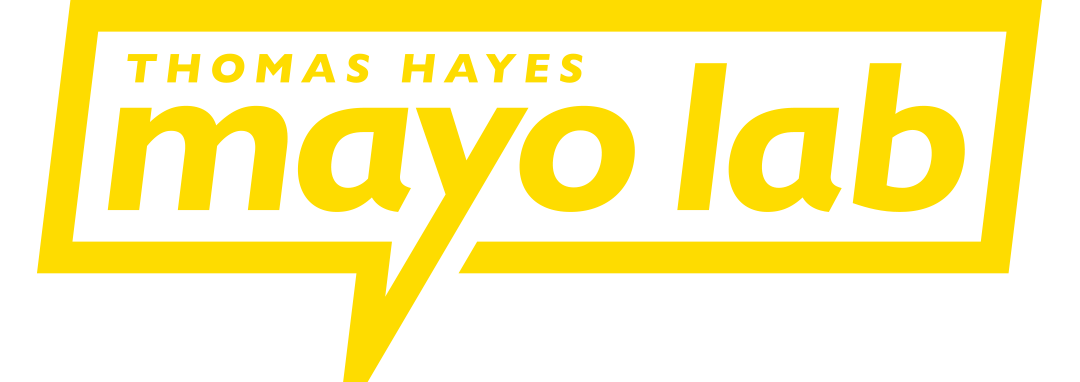Three Key Takeaways About Sobriety from The Mayo Lab Podcast
In The Mayo Lab Podcast studio, Adam Downs discusses his work with Greek organizations with David Magee and Alexis Lee.
The Mayo Lab Podcast with David Magee recently hit the halfway point of its first season, which has included episodes touching on everything from the rising potency of marijuana to finding purpose as a college student.
A recurring theme of the show has been sobriety and recovery from substance use disorders. We compiled three key takeaways about sobriety from The Mayo Lab Podcast to chew on while you’re waiting for Season I to resume this fall.
1. Sobriety is not a punishment.
Zac Clark runs alongside a student during his tour across American colleges.
The Mayo Lab Podcast kicked off with an interview with entrepreneur and recovery champion Zac Clark, who had recently finished a tour of American college campuses.
Clark talked with host David Magee about his work with young people as the founder and CEO of Release Recovery, a full-service substance use disorder and mental health organization based in New York.
“What I've tried to do is really show people that this life (sobriety) is not a punishment,” Clark said. “Because when I sit a young guy down or a young girl down and they're 15 [days], 30 [days], 3 months sober… [they’re asking,] ‘Well, how do I date?’ ‘How am I going to go to the football game?’ ‘How am I going to do this?’ And a lot of that shit's fueled by the parents because of their perception of what they want their child to be, and it keeps families sick.”
For Clark, this work is personal. He opened up to the world about his sobriety when he appeared on season 16 of The Bachelorette. On the podcast, he discussed how he uses his personal journey to encourage others.
“What I've tried to do with all that is really show people that, [the way] my life is, I wouldn't trade it for anything else, and I don't think about drugs and alcohol today,” he said.
2. Community can protect sobriety.
Dr. Adam Downs, a licensed therapist and co-founder of What Good Looks Like (WGLL), talked with Magee about his experience educating Greek organizations on mental health and substance misuse topics. As with Clark, this is personal for Downs. In 2022, he celebrated 21 years of sobriety, an accomplishment that helps fuel his work with young people.
On the podcast, Downs underscored the importance of community and—within fraternities—genuine brotherly love to successful recovery. He told the story of two brothers who got sober while in college.
“In one of (WGLL’s) fraternities in Texas, there's two brothers that are in long-term sobriety. … When they entered into the fraternity, they were not sober. They got sober, engaged a recovery program. We educated the chapter, educated the people. The chapter ended up becoming an incredible support mechanism for their sobriety,” he said.
While the journey was a personal one for the two fraternity men, the brotherhood was indispensable to their recovery. It’s a lesson, offered Downs, that all Greek men and women should keep in mind.
“It's not the chapter's responsibility to protect these guys' sobriety, but if you’re brothers, it's to be aware of it and to love them through it and to love them for it,” he said.
3. Recovery is a personal journey.
Oftentimes in recovery, there’s a disconnect between the personal journey to sobriety and the “real world”—work, school, relationships. But Fortis Academy, a recovery high school in Harris County, Texas, tries to tie all these aspects of life together, while supporting students through recovery.
The principal of Fortis Academy, Dr. Travita Godfrey, joined The Mayo Lab Podcast to discuss her experience leading the school and mentoring students.
There are only 43 recovery high schools in the U.S., so the episode also offered a rare glimpse into this innovative form of treatment and education. Fortis Academy is able to serve its students by maintaining small class sizes, with a maximum enrollment of 30 students.
“Because we're small, that's by design, so that our students have that capability where they can really work one on one and really receive a customized recovery play,” Godfrey said. “From their academics, to their treatment, to their counseling, to their recovery coaching, even down to what they eat on our campus, everything is personalized and customized because we are so small.”
Godfrey said that her work with individual students has helped her understand that—while recovery and sobriety are the goals—root problems are often what truly needs addressed for personal growth.
“It's trying to really solve what the problem is because yes, the substance misuse is a problem, but that's not the root problem,” she said. “So [I’m] really looking at what I'm doing and investigating more and trying to get to what is the root of the issue and really trying to solve that problem.”


